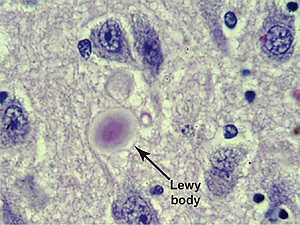Last updated: April 18, 2013
2013 News Feature Study Suggests The Gene Variants That Cause Rare Disorder Are A Risk Factor For Common Form Of Dementia
Study suggests the gene variants that cause rare disorder are a risk factor for common form of dementia
By Raymond MacDougall
Associate Director of Communications, Division of Intramural Research
 |
NHGRI researchers and colleagues from 11 centers around the world analyzed genotype data from 721 people with Lewy body dementia and 151 who had a diagnosis of Parkinson's disease with dementia, compared it with 1,962 healthy volunteers. The researchers found a significant association between study participants who carry mutations in the Gaucher disease gene, GBA1, and those with Lewy body dementia. In fact, the probability that GBA1 carriers will have Lewy body dementia is greater than for Parkinson's disease with dementia. The mean age at diagnosis of Lewy body dementia was earlier in GBA1 mutation carriers than in non-carriers (63.5 vs. 68.9 years), with higher disease severity scores.
The study, whose senior author is Ellen Sidransky, M.D., a senior investigator in NHGRI's Medical Genetics Branch, was published in the April 15, 2013, advance online edition of JAMA Neurology.
Commenting on the genetic cause, or etiology, of these diseases, the researchers concluded, "GBA1 mutations likely play an even larger role in the genetic etiology of [Lewy body dementia] than in [Parkinson's disease]."
Lewy body dementia is the second most common form of age-related dementia, accounting for about one-fifth of all cases. At least five percent of people age 85 and older are thought to have this disease. Those affected often show symptoms of Alzheimer's disease and Parkinson's disease, but most experts now consider Lewy body dementia to be a distinct disorder. There currently is no effective treatment for the condition.
For more information on Lewy body dementia, go to: NINDS Dementia With Lewy Bodies Information [ninds.nih.gov]
To access the abstract of the article, go to: A Multicenter Study of Glucocerebrosidase Mutations in Dementia With Lewy Bodies [archneur.jamanetwork.co] Posted: April 18, 2013
